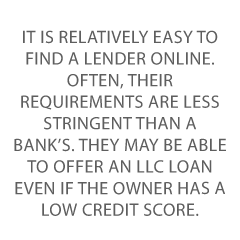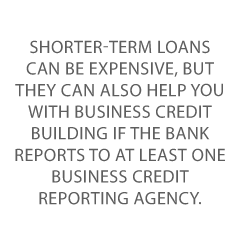How Much of a Loan Can a New LLC Get?
The amount of funding your LLC can get will depend on factors such as your length of time in business, proven revenues, collateral on offer, and the type of funding option you are pursuing. Your consumer credit score can also be a factor.
Because all lenders want to be paid back, your best bet for the most money is to tick as many of their qualification ‘boxes’ as possible.
If you have bad personal credit, consider working with a credit partner. But note: these days, lenders are more reluctant to work with credit partners. So, if the LLC has more than one business owner, make sure the owner with the better FICO score is the one to do the application.
Is it Easy to Get a Loan With an LLC?
Difficulty levels will vary depending on variables like personal credit scores, the value of any collateral on offer, the amount of time in business, and the amount of regular revenue you can prove.
Some funding options will be easier to get than others if you are lacking in any of these areas but strong in others. For a business with provable regular incoming credit card income, an MCA will be fairly easy to get—regardless of the owner’s personal FICO score.
And for an LLC with valuable collateral to offer (like land, buildings, or heavy equipment), a term loan may be easier to get.
How to Get a Business Loan for an LLC
Marshall your resources and do research before you apply for any form of small business loan. This means checking your personal and business credit reports to be sure they are accurate. Take steps to fix any errors and raise scores if necessary.
Have a professional accountant go over the books to be sure you can supply clear proof of incoming revenues. If an application requires that you provide tax returns, having them prepared professionally can only help you.
Make sure other necessary documents are in hand and are correct, such as lease agreements, business licenses, personal identification (like a driver’s license), and proof of good standing with your local Secretary of State.
Credit Suite can help you with determining where you are most likely to qualify for funding, and in improving your credit so your business can qualify for the most funding at the best rates. Contact us today to explore your options.
Looking for an LLC startup loan? A limited liability company will need business financing, just like any other form of business. A properly formed LLC can apply for the same types of small business loans or other financings that other businesses can.
The best small business loans are out there, and your LLC can be eligible for them.
Loan Option 1 – an SBA Loan
The purpose of the Small Business Administration is to help small business owners as you succeed. To qualify, a business must be small per the SBA’s definition, and it has to be operated in the United States.
The SBA has extensive documentation requirements such as tax returns and licensing agreements. Because the SBA backs these loans, a lender can offer a lower interest rate and open up the loan to a variety of entrepreneurs—even those with a poor personal credit scores.
To help out small businesses, the SBA facilitates three major business loans.
7a Loans
The SBA 7a loan is their most popular small business loan. This SBA loan is a financial help for businesses needing:
- Short- and long-term working capital
- To refinance current business debt
- To purchase furniture, fixtures, and supplies
The SBA specifically recommends the 7a for real estate purchases.
You can get up to $5 million with this particular loan.
504 Loans
The 504 is long-term, fixed-rate financing for major fixed assets that promote business growth and job creation.
The maximum loan amount for this SBA loan is $5 million. But for certain energy projects, the borrower can receive a 504 loan for up to $5.5 million per project, for up to three projects not to exceed $16.5 million in total.
Microloans
If a limited liability company does not need a lot of capital, then a microloan may be the best financing option for an LLC business loan.
SBA microloans are only available through certain nonprofit, community-based organizations that are experienced in lending and business management assistance. Individual requirements will vary.
You can get up to $50,000 with this particular type of loan.
Loan Option 2 – a Loan From a Community Development Financial Institution
The CDFI fund is administered by the Department of the Treasury. It offers tailored resources and innovative programs investing federal dollars alongside private sector capital.
CDFIs seek to better the conditions in economically underserved markets.
The Fund serves mission-driven financial institutions to take a market-based approach to support economically disadvantaged communities. These organizations are encouraged to apply for CDFI Certification and participate in CDFI Fund programs.
The idea is to inject new sources of capital into neighborhoods that lack access to financing.
The Fund does not make small business loans (or any other sort of loan) directly. Rather, it provides funding to CDFIs across the country. CDFIs then use that funding to offer business loans and other financings.
Startup LLCs not needing a lot of money might want to consider their Small Dollar Loan Program. Particularly for entrepreneurs with bad personal credit, the SDL program makes it possible for them to get money without having to take out costly payday loans.
LLC owners playing the long game might want to take advantage of the CDFI Fund’s New Markets Tax Credit Benefits program. The 2023 program year is closed to applications, but the 2024 program year will open up for entrepreneurs to apply in the autumn of 2023.
Loan Option 3 – Invoice Financing (Factoring)
Invoice factoring is when you leverage incoming invoices for small business funding. It is particularly useful if you provide long terms to pay, such as net 90.
Invoice factoring offers fast funding for businesses that qualify. In these cases, by working with a factoring company, you can effectively sell payments you’re owed for outstanding invoices and shift your risks to a factoring company if your client pays late or fails to pay their invoice.
A business might offer a customer net 90 terms in order to get their foot in the door with a big client, or just to start making money. However, the LLC still needs to pay its own bills. With this kind of financing, they can get a percentage of the amount owed faster than net 90.
As a result, the client is happy with longer payment terms, and the LLC is happy because they have enough money to pay their own accounts. This type of funding costs a certain percentage of the outstanding invoice(s).
The factoring fee, also known as the discount rate, can often run from 1% to 5%, depending on the invoice amount, your sales volume, your customer’s creditworthiness, and whether the factor is recourse or nonrecourse.
The factor type shows who is ultimately responsible for an invoice that goes unpaid. Is it your company or the factoring company itself?
Loan Option 4 – a Credit Card
You don’t have to use a personal credit card. Rather, you should be building credit for your business. A business credit card is a much better choice for business financing.
Even a bad credit score is no obstacle, once you know how to build business credit. Unlike consumer credit, you have to actively and intentionally build business credit. Fortunately, we know how.
Many if not most business credit card applications will ask for your personal information. This is for identification purposes. But you can still find you’re offering a personal guarantee (PG) if you’re not careful.
A personal guarantee means a credit provider will check your FICO credit score and other information with a hard pull. This can bring your personal credit score down, but that’s only temporary.
But a personal guarantee will also put you on the hook if you ever default in paying off your business credit cards.
Dole out PGs judiciously. There’s nothing really wrong with them. But they are valuable. So, if you’re going to have your credit score lowered, do so for a good reason.
The advantage of using corporate credit cards is also that, by paying it on time, you will raise your business credit score. So, use them for supplies.
Loan Option 5 – a Business Line of Credit
A business line of credit is a lot like a credit card but without plastic. A limited liability company can use a business line of credit over and over again, unlike an LLC loan, where there is just a fixed amount of cash and that’s that.
Like with credit cards, a small business has a certain amount of capital it can spend with a line of credit. But unlike with a loan, the line of credit is replenished when the small business pays back the balance.
This convenient form of funding is popular among business owners (not just the owners of LLCs) but not every lender will offer it.
For a startup LLC in particular, lenders will most likely want some form of security for the line of credit. This means offering up collateral. If the LLC is relatively new, there probably won’t be enough valuable collateral just from the business itself to secure the line of credit.
As a result, an owner of a startup LLC may need to provide personal collateral. For most people, their biggest assets are their homes, retirement funds, and cars.
This means there can be some unpleasant consequences if the LLC ever defaults.
Loan Option 6 – Cash Flow Financing
An LLC can get an LLC business loan by leveraging incoming revenues. If your small business can prove it regularly receives incoming revenue, you can use that to get this form of funding.
Incoming revenues are valuable to lenders, so being able to prove revenue can be very helpful.
This is an especially good form of funding if your LLC can prove incoming revenues but you do not have a lot of valuable assets to offer as collateral. This is often the case with service companies.
For cash flow funding, you will need to prove incoming revenues. Since a startup is not always a business that just opened its doors yesterday, there are some startup LLCs that will be able to prove that they are receiving regular incoming revenue.
Because this kind of financing is fast, businesses can use it to lock in good, time-sensitive deals. It is also a good choice for buying inventory or investing in new equipment (but see also equipment financing).
A corporate credit card is a form of cash-flow financing. Term loans, credit lines, and invoice financing are as well. MCAs are yet another form of this particular species of funding.
Loan Option 7 – a Term Loan From an Online Lender
It is relatively easy to find a lender online. Often, their requirements are less stringent than a bank’s. They may be able to offer an LLC loan even if the owner has a low credit score. 
And they may offer an LLC business loan even if the LLC does not have terribly high annual revenue yet. But recognize that these business loans can potentially come with a higher interest rate.
Business loans from these lenders are generally safe but it never hurts to check a lender on the Better Business Bureau website. Check other review sites like Google and Yelp to get an idea about an online lender’s customer service reputation.
Two of the oldest and most established online lenders are OnDeck (founded in 2006) and Lending Club (founded in 2007).
OnDeck, for example, offers term loans, MCAs, equipment financing, SBA loans, and lines of credit. Lending Club offers SBA, commercial real estate, flexible loans, and equipment financing.
Term lending from OnDeck goes up to $250,000. You can get a repayment term of up to 24 months. You must have at least one year in business and a FICO score of 625 or better. Your LLC must be bringing in $100,000 in annual revenue or more. The LLC must have its own bank account.
Term lending from Lending Club goes up to $500,000. You can get 1 – 5 year terms with fixed monthly rates, with no prepayment penalties. You must have at least twelve months in business and $50,000 or more in annual sales. The company must be based in the United States.
And, to qualify for loans from Lending Club, you, the applicant, must own at least 20% of the business.
Other well-known online lending providers include Funding Circle, Kabbage Funding, and National Funding.
Loan Option 8 – a Term Loan From a Credit Union
Credit unions are one place many people think of for personal loans. But they are also a good lender for an LLC loan.
Often, these business loans will come with better interest rates than business loans from banks. They may come with lower transaction fees as well.
Consider the Navy Federal Credit Union. You can get commercial real estate loans, lines of credit, and vehicle and term loans.
Get a term loan for the purchase or refinancing of equipment, vehicles, or heavy-duty trucks. There is no prepayment penalty. Get a loan to value up to 75%, depending on the type of equipment. There is a $150 origination fee.
Also, lien search and recording fees may apply and vary by state.
These kinds of loans are best for:
- Commercial equipment
- Computer equipment
- Leasehold improvements
- Expansion
To apply, you will need to provide:
- A completed and signed business loan application
- Purchase invoice/buyers order which includes a serial number(s) if applicable, to ensure proper lien filing and sales price
- A certificate of insurance with Navy Federal listed as a Loss Payee
- Personal guarantee
- Personal credit check
Note: to become a member, you or one of your family or household members must have ties to the armed forces, Department of Defense, or National Guard.
Loan Option 9 – a Bank Loan From a More Traditional Lender
This is the kind of business loan most people think of when they consider how and where to get funding. And while a bank is less likely to offer a startup business loan, that does not mean it’s impossible to get one.
Recognize that banks are understandably risk-averse. This means that they will want to see the business owner has a good credit score and a business (even a startup) has a decent annual revenue.
To mitigate their risk, banks may also offer a shorter loan term or other less favorable repayment terms.
But once you start to think like a lender—in particular, a traditional lender—it will help you to see how to assure them that your small business will pay back any business loan.
And if your small bus iness is more likely to be approved for a shorter-term loan, determine if that will be a net positive or negative.
iness is more likely to be approved for a shorter-term loan, determine if that will be a net positive or negative.
Shorter-term loans can be expensive, but they can also help you with business credit building if the bank reports to at least one business credit reporting agency.
Longer-term loans can have a lower interest rate but you may find you are paying out more in interest over time.
To be best positioned to qualify for a loan from a traditional lender, make sure to build business Fundability™.
Loan Option 10 – a Personal Loan
Business financing really should not be via a personal loan—unless it’s a home equity line of credit (HELOC). A HELOC essentially uses your home as collateral.
Often, you will be able to get a HELOC through an equal housing lender.
Your annual revenue will not be an issue because here the lender will be a lot more interested in your personal credit score. This means it is likely there will be a hard pull on your personal credit when the lending institution is determining whether to extend the loan to you.
But this type of funding does not come without risk. While HELOCs may prove easier to get than business loans, your domicile is on the line. Defaulting on these types of non-business loans can mean losing your home.
A default can also tank your personal credit score, which means you would have trouble rebuilding your life, too.
So, business loans are generally considered to be a better way to get a startup loan and other funding. So, you should probably consider other funding options before going this route.
In particular, if your LLC has proven revenues or credit card income, then MCAs or invoice funding can potentially be much better choices.
FAQs
How Much of a Loan Can a New LLC Get?
The amount of funding your LLC can get will depend on factors such as your length of time in business, proven revenues, collateral on offer, and the type of funding option you are pursuing. Your consumer credit score can also be a factor.
Because all lenders want to be paid back, your best bet for the most money is to tick as many of their qualification ‘boxes’ as possible.
If you have bad personal credit, consider working with a credit partner. But note: these days, lenders are more reluctant to work with credit partners. So, if the LLC has more than one business owner, make sure the owner with the better FICO score is the one to do the application.
Is it Easy to Get a Loan With an LLC?
Difficulty levels will vary depending on variables like personal credit scores, the value of any collateral on offer, the amount of time in business, and the amount of regular revenue you can prove.
Some funding options will be easier to get than others if you are lacking in any of these areas but strong in others. For a business with provable regular incoming credit card income, an MCA will be fairly easy to get—regardless of the owner’s personal FICO score.
And for an LLC with valuable collateral to offer (like land, buildings, or heavy equipment), a term loan may be easier to get.
How to Get a Business Loan for an LLC
Marshall your resources and do research before you apply for any form of small business loan. This means checking your personal and business credit reports to be sure they are accurate. Take steps to fix any errors and raise scores if necessary.
Have a professional accountant go over the books to be sure you can supply clear proof of incoming revenues. If an application requires that you provide tax returns, having them prepared professionally can only help you.
Make sure other necessary documents are in hand and are correct, such as lease agreements, business licenses, personal identification (like a driver’s license), and proof of good standing with your local Secretary of State.
Credit Suite can help you with determining where you are most likely to qualify for funding, and in improving your credit so your business can qualify for the most funding at the best rates. Contact us today to explore your options.


